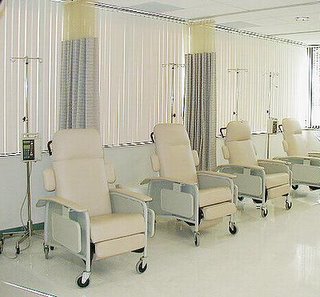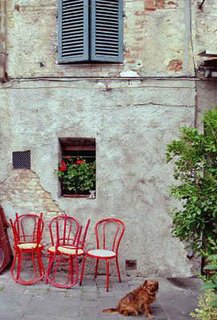It is April 2005, and I am getting a Rituxan infusion, having gone more than a year since my first course of Rituxan put me into a partial remission. In the chair to my left is a woman with short hair, 50ish, taking a new treatment for pancreatic cancer. The old one stopped working after six months, and the prognosis is not good.
Her name is Lynn, and she is often on the cell phone with her husband.
“He’s always hopi
 ng to find a miracle cure,” she tells me, in between calls. She says it with the loving indulgence that spouses sometimes allow for the excesses of their mates.
ng to find a miracle cure,” she tells me, in between calls. She says it with the loving indulgence that spouses sometimes allow for the excesses of their mates.Despite her situation, Lynn is sunny and breezy. We talk about her recent trip to Italy, a sunny and breezy place. We compare cities we've been to and sights we've seen, and then I learn that she’s my next-door-neighbor’s ex-boss.
Small world, since I live two hours away, in a small town. Turns out that she lives there, too.
Also turns out she had the same doctor I had initially, a certain Dr. Lippencot, and that she, like me, was a refugee seeking a better standard of care. Lippencot had treated Lynn for breast cancer a few years back, and later for pancreatic cancer. When Lynn’s pancreatic cancer relapsed, she called Lippencot’s office to ask that a regularly-scheduled appointment be moved up. She was told that this was impossible. When she pushed and pushed and finally got in to see Lippencot’s partner, she was told there was only one treatment that could be done, that it had been done, and that nothing else could be done.
Lynn took to the internet, a rite of passage for patients these days, and found a new but experimental treatment. Then she found a new doctor, my doctor, whose medical knowledge is a bit more current, and who was willing to give Lynn's hope a chance.
So here Lynn sat, next to me, telling her husband to pick up something for dinner, jawing about Rome and how pancreatic cancer has a two-year median survival, almost in the same breath.
On the other side of me is a woman in her late 30s, early 40s, undergoing treatment for breast cancer that has spread to her liver. Apparently the first round of treatment had resulted in a 100-point drop in whatever measurement of cancer is used in such cases. This is a good response, I gather, but her number is still high, 400 or so.
An older woman, who I take to be her mother, is in tears.
“That’s such good news. It’s out of your liver. I bet it’s out of your liver.” Her words betray an uncertainty, and are stated as if speaking them aloud will make them true.
“We should have kept up with the chemo before,” the mother went on. “No use kicking ourselves in the butt about it now.” I can tell there has been much kicking, much anguish. Again, I think that by speaking the words, she hopes to make them true.
The young woman keeps up a brave face, says she is grateful for the 100-point drop, but says she knows there is a lot farther to go. She looks tired, apprehensive. She asks the nurse for a drug to calm her nerves.
I sit in the middle, likely destined to outlive both my chairmates. I am reminded that the road could be harder, that the end, if it is to be, could be more abrupt.

For Lynn, the end came last month. I met my neighbor when he was out walking his dog; Lynn had fallen into a coma in her last few days, and then died. From the time I saw her in Chemoland, she had lived another nine months.
There was an obit in the paper, written with love and care, probably by that husband who was always hoping for a miracle.
“She loved life, embraced every moment and adored adventure and travel. She was a mentor, inspiration, and friend to many, while helping those in need. She saw the best in people and offered great encouragement. She was a loving mother, wife, daughter and sister. She was greatly loved and will be missed.”
There was a picture, too. She had long hair, and a beaming smile, and her eyes were sparkling as much as they could in black and white.
Godspeed, Lynn, Godspeed.





4 comments:
A poignant story. Thanks for reminding those of us on the prescribing end of the chemo process what it is like to be on the receiving end.
Which raises a question: As a patient in a chemo room, do you like being able to visit with others who are sharing your experience, or would you prefer to have the chairs isolated and more private?
How you manage to convey such emotion in a narrative is wonderful. You made me feel as if i knew her. I wonder how we build up this tolerance we seem to have to the sights and plights of other patients, I never had it before, just mush. the thing that really gets to me are the children and young parants. we're lucky David, we have a good bit of living behind us and more on the horizon. Well done.
Thanks for a very well written post, as always, David. It amazes me the connections we make with others that we would not have made without this disease. To me the connection seems more instantaneous and deeper than the connections made pre-disease. My empathy has been honed and my emotions seem more intense. I still can't forget the very sad, hurting, wisp of a lady I met at the cancer clinic at the beginning of December and I look for her, without success, at every visit. You are right, Arlene, the children make my heart hurt.
Vance, I don't want to be isolated in my journey. However, during chemo I never intrude on others who are there. A friendly hello or nod to them pretty quickly tells me if they prefer to remain in their own private thoughts.
Vance,
As to your question, I think I would err on the side of privacy. Not every patient wants to chat, or to be set up so that they are staring at someone else and feel like they have to. The straight-ahead method still allows you to visit with those on either side, but also lets you doze, read, meditate, or whatever in peace if you want.
One thing that does bother me is that my onc's office will not allow any friends or family to sit with you beyond your first infusion. This is ostensibly for privacy reasons. I don't see where it matters, and I think it should be allowed.
David
Post a Comment